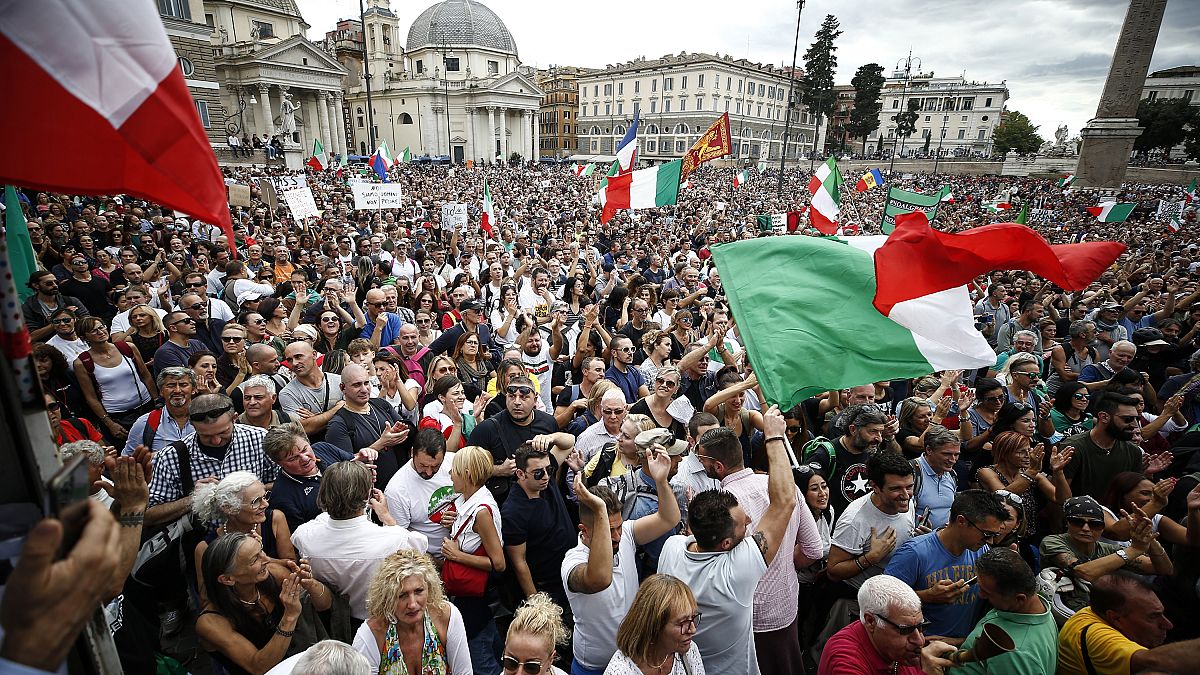Thousands have demonstrated over COVID passes being made mandatory for employees to enter their workplaces.
Protests erupted in Italy as its COVID health pass became mandatory for all workers.
Police were out in force, schools ended classes early and embassies issued warnings of possible violence amid concerns that the anti-vaccination demonstrations could turn violent, as they did in Rome last weekend.
The violence in the capital was blamed on a small far-right group, Forza Nuova, which experts say infiltrated last weekend's protests.
The new rule means employees will have to show the pass to enter their place of work. The pass proves the individual has been vaccinated, has recovered from COVID-19 in the last six months and or has recently tested negative.
Employees and employers risk fines if they don’t comply. Public sector workers can be suspended if they show up five times without the pass.
The pass is already required in Italy to enter museums, theatres, gyms and indoor restaurants, as well as to take long-distance trains and buses or domestic flights.
More than 85% of Italians over the age of 12 have received at least one dose, but up to three million more, unvaccinated, are at risk of being denied access to their workplaces.
“Today they are stepping on our Constitution," said an anti-vaccine protester, Loris Mazzarato. “I say NO to this discrimination.”
He was among the hundreds of demonstrators in Trieste, where protests by port workers refusing to show a Green Pass threatened to impact commercial activities, though early reports suggested the port remained operational.
Ivano Russo, director-general of Confetra, the Italian General Confederation of Transport and Logistics, an employers' association, told AFP that out of a total of 900,000 truck drivers, couriers and warehouse workers, "between 25 and 30 %" do not have a health pass.
The government has offered free tests to dockers in Trieste, while some terminal operators in the port of Genoa offer to pay themselves.
"The real problem with the Green Pass for the port of Genoa, and in general for all ports, will be road transport," Roberto Gulli, of the Uil union, told La Repubblica newspaper. "There could be chaos on Friday."
The government of Prime Minister Mario Draghi has defended the health pass as a way to avoid further lockdowns in Italy, one of the European countries hardest hit by the pandemic, which has killed more than 130,000 and led to a drop in its GDP of 8.9% in 2020.
Electronic scanners that can read cellphone QR codes with the Green Pass were set up at bigger places of employment, such as Draghi's office and the headquarters of state railway company Trenitalia.
But at smaller places of work, from restaurants to tennis clubs, employers and managers had to download an app that can scan the codes. While it was unclear how strictly Italy would enforce the requirement, the fear of spot checks drove employers to comply, at least initially.
Sanctions for employers who fail to check employees range from €400 to €1,000. A worker who fails to show a Green Pass at work is considered absent without justification; if the worker shows up anyway without a valid Green Pass, he or she could face fines from €600 euros to €1,500.
And if recent days were any indication, the new rule was working to encourage even more shots. Already 81% of the population over age 12 has been fully vaccinated, but the number of first shots administered Thursday shot up 34% compared to the beginning of the week, Italy's virus czar reported Friday.
But for those people who can’t or won't get their shots, the expanded pass requirement imposes a burden of getting tested every 48 hours just to be able to go to work. People with a proven medical condition that prevents them being vaccinated are exempt.
The new rule is not a vaccine mandate, since a negative test or proof of being cured of COVID-19 are other ways to get it. In Italy, only health care workers are required to be vaccinated, and teachers and school administrators have had to have a Green Pass to work since Sept. 1.
The vaccination programme has kept infection rates low and Italy is expected to grow 5.8% this year, according to the latest IMF forecast.
